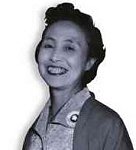Shidzue Katō facts for kids
Quick facts for kids
Shidzue Katō
|
|
|---|---|
 |
|
| Member of the House of Councillors for National District |
|
| In office June 4, 1950 – July 7, 1974 |
|
| Member of the House of Representatives for Tokyo 2nd District |
|
| In office April 10, 1946 – December 23, 1948 |
|
| Personal details | |
| Born |
Shidzue Hirota
March 2, 1897 Tokyo, Empire of Japan |
| Died | December 22, 2001 (aged 104) Tokyo, Japan |
| Political party | Japan Socialist Party (1946–1951, 1955–1979) Rightist Socialist Party (1951–1955) |
| Spouses | Keikichi Ishimoto (1914–1944) Kanjū Katō (1944–2001) |
Shidzue Katō (加藤 シヅエ, Katō Shizue, March 2, 1897 – December 22, 2001), also known as Shidzue Ishimoto, was a very important Japanese woman. She was a feminist, meaning she worked for equal rights for women. She was also one of the first women ever elected to the Diet of Japan, which is Japan's parliament.
Contents
Early Life and Family Background
Shidzue Katō was born on March 2, 1897, in Japan. Her family was wealthy and had a history as samurai. Her father, Hirota Ritarô, was a successful engineer. He studied at the Tokyo Imperial University. Her mother, Tsurumi Toshiko, came from a well-educated family.
Because her father often traveled to Western countries for work, Shidzue and her family grew up familiar with Western ideas and things. When she was 17, Shidzue married Baron Keikichi Ishimoto. He was interested in making society better for everyone.
Moving to the United States
Soon after their marriage, Shidzue (then Ishimoto) and her husband moved to a coal mining area in Japan. For three years, they saw the difficult working conditions there. This experience made them unwell, so they moved to the United States in 1919.
In the United States, Shidzue's husband became more interested in radical political ideas. Shidzue started to live more independently. Her husband went to Washington D.C. to help with a big meeting about workers' rights. During this time, Shidzue lived in an apartment and took classes to learn secretarial skills and improve her English.
Return to Japan and Activism
When Shidzue returned to Japan in 1921, she wanted to be financially independent. She worked as a private secretary for the Y.W.C.A., introducing Japanese culture to Western visitors. She also opened a shop called Minerva Yarn Store, selling imported wool.
Around this time, Shidzue met Kanjū Katō, who would later become her second husband. They met in 1923 when Kanjū, a worker's rights organizer, asked her to speak to miners. Shidzue later divorced her first husband and married Kanjū Katō in 1944.
Shidzue Katō believed that children born to healthy parents would have a better start in life. In 1937, the Japanese government arrested Katō. This was because she promoted ideas they considered "dangerous." She was held in prison for two weeks.
Serving in the Japanese Parliament
Shidzue Katō was the first woman to run for office in Japan. She campaigned on a platform that focused on American-style democracy and improving women's lives. In 1946, she was elected to the Diet of Japan, which is Japan's national parliament.
She believed that for Japan to become a true democracy, women needed to be free and have better lives. Even though she was one of the few women in the mostly male parliament, she found other ways to make changes. In 1946, she helped organize the first "women only" rally in Tokyo. This rally asked for more economic support for women.
Katō was later elected to the Upper House of the Diet four times, each for a six-year term. She continued to fight for women's rights. She worked to change old family laws, create a special office for women and children in the Department of Labor, and protect the environment.
Awards and Recognition
Even after she retired from politics, Shidzue Katō kept working for change. She gave talks about women's issues and continued to lead the Family Planning Federation of Japan.
In 1988, the United Nations gave Katō an award for her work on population issues. In 1996, the Katō Shizue Award was created to honor her. This award helps women's groups and individual women who are working to empower women in developing countries and Japan.
Death and Lasting Impact
Shidzue Katō passed away on December 22, 2001, at the age of 104. Her work helped pave the way for women's rights and political involvement in Japan.
Books by Shidzue Katō
- Facing Two Ways: The Story of My Life, published in 1935. A version for children, East Way, West Way: A Modern Japanese Girlhood, was published in 1936.
- Straight Road, published in 1956.
- Katō Shizue Hyakusai, published around 1997.
See also
 In Spanish: Shidzue Katō para niños
In Spanish: Shidzue Katō para niños
 | Janet Taylor Pickett |
 | Synthia Saint James |
 | Howardena Pindell |
 | Faith Ringgold |

